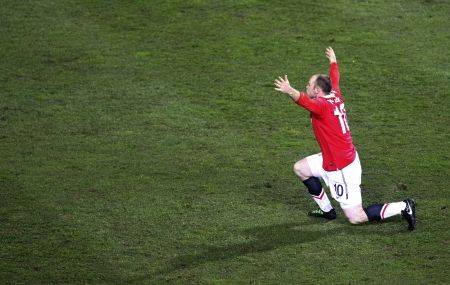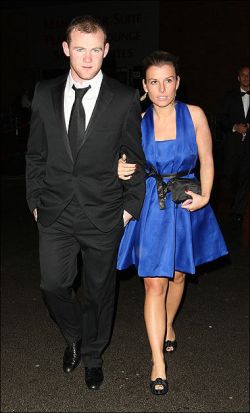In the heat of the moment, Wayne Rooney said the F-word. That’s all.
It has nothing to do with him being an over-paid footballer (they all are in the EPL), nothing to do with the Respect campaign (wasn’t that supposed to be for match officials?) and DEFINITELY nothing to do with the Premier League’s image.
He’s just a 25-year-old who’s had the worst year of his life, he’d been boo-ed every time he touched the ball at Upton Park, and when he finally redeems himself with a season-saving hat-trick, he let it all out in an ill-advised outburst.
But that hardly makes him the embodiment of everything that’s wrong with the modern footballer.
He shouldn’t have said it, that’s for sure. The two-match ban is deserved and Manchester United probably shouldn’t contest it. It’s a bit harsh, but given the timing of the incident, with the Respect campaign and all, one would expect the first person to break the rules to be made an example of. He can’t complain. He messed up. That’s it, case closed. Why does it have to be made into such a big deal?
The reaction from some sections of the press has been simply ridiculous. They’re turning him into some kind of villain, the face of the evil footballer, which he certainly isn’t. But that’s what they’ve done with Rooney for most of his career. That’s how they’ve chosen to portray him.
During a holiday last year sanctioned by Alex Ferguson when he was injured, the paparazzi were snapping photos of him lounging by the pool with his wife Coleen and reporting how expensive their poolside snacks were.
They were shamelessly exploiting the raw emotions caused by the recession, playing up the prices of SNACKS – chips, sandwiches, drinks – at the hotel to keep the furore surrounding Rooney alive, to feed the monster.
They call him Shrek, but yet expect him to behave like a perfect gentleman. They regularly write about him and his wife in harsh, demeaning tones, and then refuse to allow them any room for mistake. In fact, they feed on their mistakes. I’d know. I’ve had to try very hard not to make any below-the-belt jibes at John Terry and Ashley Cole’s countless indiscretions, and I’ve had a go or two at Rooney in the past.
But of all of them, Rooney is the easiest target. He isn’t blessed with superstar good looks (quite the opposite, to be frank), he’s a bit rough around the edges (he can’t change his upbringing, can he?), and he wears his heart on his sleeve.
Given the amount of stick he receives in the media, the unflattering and often downright unfair coverage he AND his wife gets, there’s just no way he can conduct himself perfectly every single day. Something’s gotta give.
And last weekend, something did. He let slip the F-word. After a year of being villified by the public, an entire career of being crucified by the press with every mis-step, and a whole day of boo-ing and abuse from West Ham fans, he cracked under the weight of emotion that comes with scoring an important hat-trick.
We all have different ways of dealing with strong emotions – for someone like Rooney, having grown up without much in a very rough part of Liverpool, those emotions sometimes manifest themselves in seemingly aggressive actions. I’m not saying it’s right, but it’s certainly not what some are making it up to be.
I read one football columnist asking why is Rooney no longer playing football with a smile like Lionel Messi in Barcelona, in a tone that suggested Rooney’s negativity might become a pandemic and ruin football. The simple answer is because the papers in Spain don’t call Messi “Shrek”, they don’t call his wife a chav, and they appreciate his talent. They don’t heap unnecessary pressure on him, build him up to be something he’s not, and then tear him down when he doesn’t meet those expectations.
He also asked why Rooney seems so angry even though he’s a well-paid footballer. That’s because no amount of money can keep someone from feeling angry when he feels that he – and at times his family – is being unfairly targeted.
Another writer wrote proudly of how he survived a confrontation with Rooney in Dubai, where the writer was “reporting” about the Rooneys’ excessive poolside expenses.
He painted a picture of Rooney as an ugly, snarling, “pugilistic” gangster (the headline itself referred to him as football’s “neanderthal”) with “veins bulging from his prematurely high forehead”, and his wife as speaking in “fish-wife vernacular”. He goes on to comment on how comical they looked, especially how Coleen “clattered along in glittery high heels” and was wearing “thickly painted-on eyebrows”.
He then conveniently chips in a couple of paragraphs on why he was right to have reported on the Rooneys’ spending, which he continued to justify by labelling it “their self-indulgent, chav-like behaviour while holidaying at a seven-star hotel”.
Anyway, all this talk about him being over-paid is pure hypocrisy. He and all the other Premier League players are paid well because the fans want to see the best players in their team. The journalists’ livelihoods depend on the league being strong and having the best players on the pitch. The journalists WANT the league to have big transfers, they WANT the biggest superstars to be in the Premiership, and they WANT to be able to write about them.
But at the moment, it seems some of them also want those players to fail, if only so they can produce their own obscenely slanted version of the story.



Tell us what you think!